Mindfully Maintaining your Emotional Health
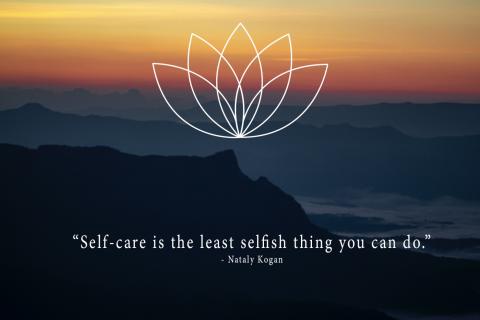
The past few years have been hard on so many of us. From feeling isolated and overwhelmed, to anxious, depressed and out of control, many of us are struggling. This kind of stress can manifest itself physically in our bodies and cause pain, headaches, stomach troubles, tense muscles, trouble breathing and more. Plus it can prey on our minds with depression, anxiety and worry.
That's why self-care is so important! Taking time to care for ourselves is our best defense and as Nataly Kogan says, "Self-care is the least selfish thing you can do." Below you'll find 11 self-care tips for finding balance and well-being from Youth and Family Resiliency State Specialist Kendra Lewis.

Self-Care Tip One - Breaking the Cycle of Negative Self-talk
"I failed. I'm not smart. I can't do anything right!" We often catch ourselves talking internally in ways we'd never speak to someone else. Paying attention to this kind of destructive inner chatter can be an important way to break the cycle of negative self-talk. It can often be helpful to think of advice or words of encouragement someone else might offer to you. It's also important to recognize when you are spiraling into negative thoughts and catch yourself. Then replace those extremely negative thoughts with a more balanced and realistic thought.
Train yourself to look for the "evidence" when you're thinking in a negative way. Often we're not giving any credit to the positive evidence that disproves our negative thought. Your first thought might be, "I am a failure at my job, I'm not answering my emails quickly enough." But look more closely at the evidence to the contrary: has anyone had to follow up with you or nudge you? Are you still answering emails within 24-48 hours? Are you still answering critical emails right away and answering less critical ones later? The balanced thought here is, "I'm doing the best I can with the time I have and I'm prioritizing my work."
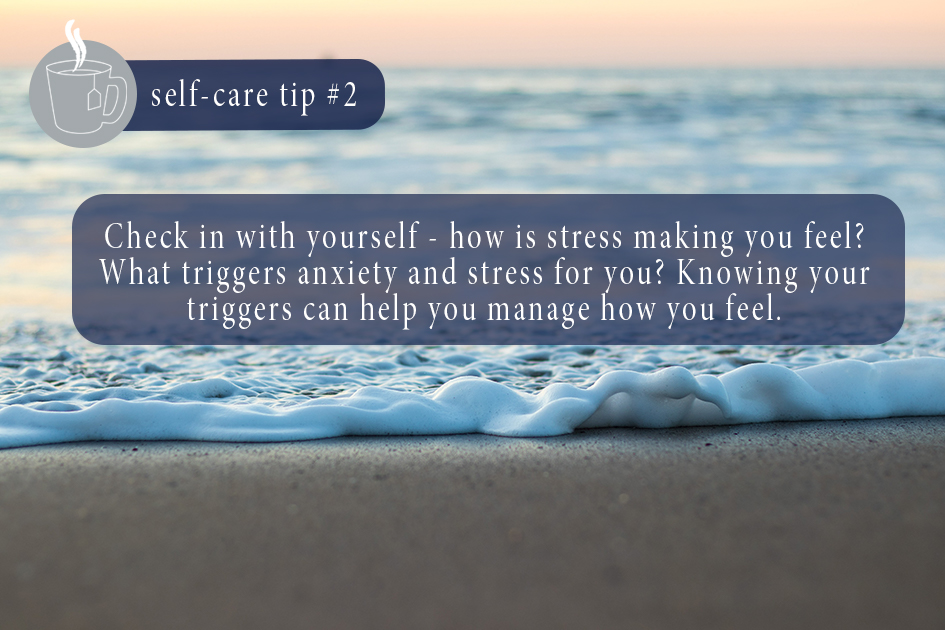
Self-care Tip Two - Noticing How you Feel
If you feel unwell or under the weather, if can be easy to shrug it off and try to go about your day. But why are you feeling unwell? Checking in with yourself and noticing how you feel both physically and mentally can help you better understand when you're stressed and what triggers stress and anxiety. Our bodies often let us know that something is wrong and if we pay attention, we can do a lot to mitigate negative physical and mental sensations and feelings through caring for ourselves.
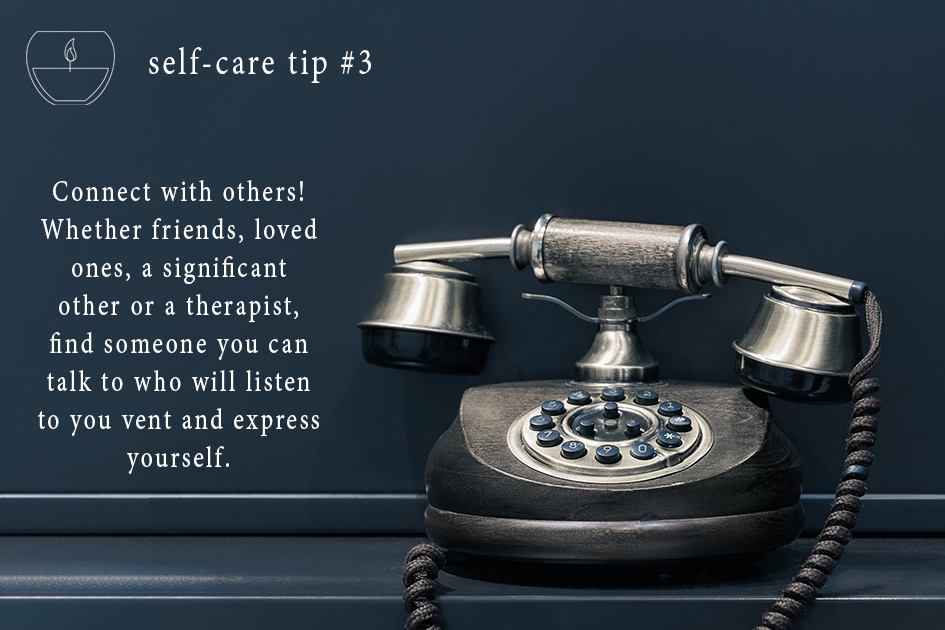
Self-care Tip Three - Connecting with Others
We're all struggling together during COVID-19 and many of us are feeling alone and isolated. Reaching out to connect with others, whether friends, family or a therapist can be an important stress management technique that lets you feel you are not alone!
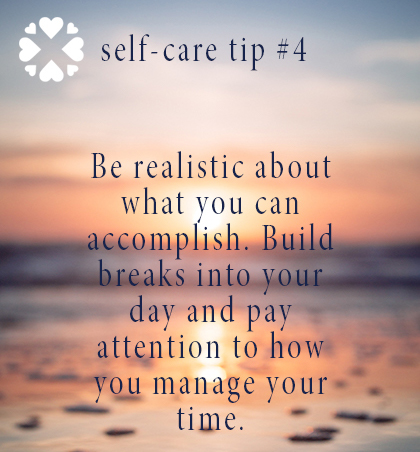
Self-care Tip Four - Have Realistic Expectations
We often set unrealistic expectations for ourselves as many of us are perfectionists. Being realistic about what you can reasonably accomplish during a day is important and recognizing that we all have off days where we just can't get as much done as we had hoped.
Give yourself permission to take a break, in fact build them into your day, particularly if you have something to do that often makes you feel anxious or stressed. Another positive tip that can go hand-in-hand with having realistic expectations is practicing patience and giving yourself some grace. This pandemic is new to us all and we're all trying to move forward. Be gentle with yourself and with others. Be patient with yourself, with others and with the situation.
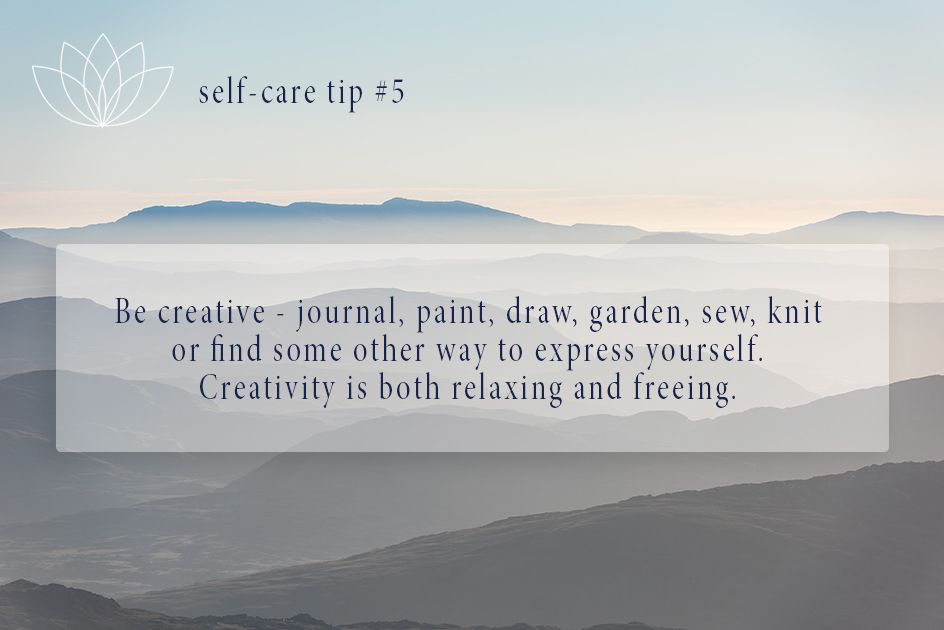
Self-care Tip Five - Creativity is Key
Creativity is life! Even if you don't think of yourself as a creative person, there are many creative activities that can help you feel more calm and balanced. From journaling out your feelings to keeping a nature journal to organizing a closet or doodling, there are creative ways to keep your mind active and give you a chance to rest and recharge.

Self-care Tip Six - Movement and Nature
You've heard it before...just a few minutes in nature can change your outlook and it's true! Nature is a balm to the soul. So next time you're feeling stressed and overwhelmed, get outside for a brisk walk, clear your thoughts, feel the sun on your face, the wind in your hair and breathe deeply. You'll be glad you did!
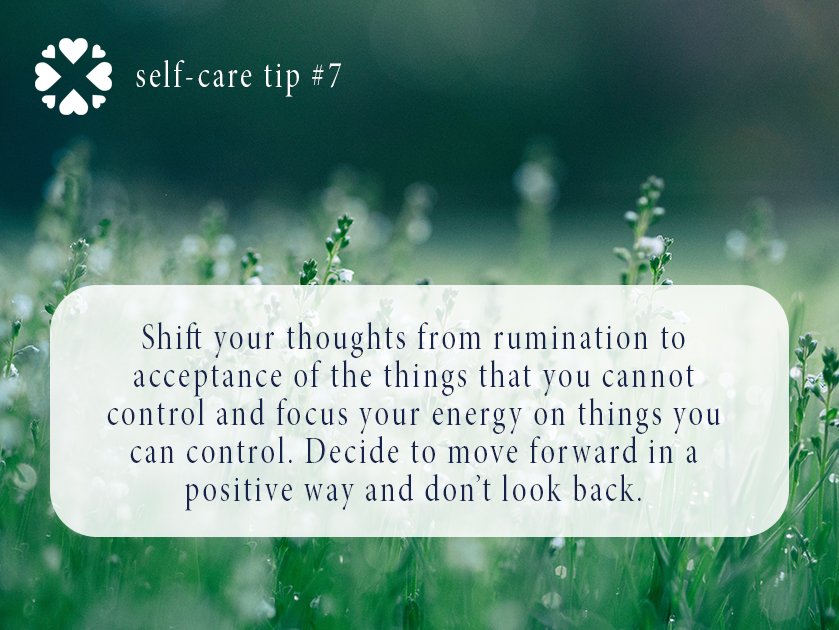
Self-care Tip Seven - Acceptance
Rumination or obsessively thinking negative thoughts about things we cannot change is a destructive habit that too many of us have and it can be hard to break this pattern of overthinking. Practicing acceptance of the things that we cannot change and focusing our energy on those we can is an important coping method. Next time you find yourself ruminating, ask yourself...is this something I can change? If the answer is no, try to let it go.
It is also important to try to accept things that happen. Instead of labeling an event in your life as good or bad, realize that it just "is." It is also helpful to be okay with not being okay. We don't always have to be fine and it's okay to admit when we don't feel fine.
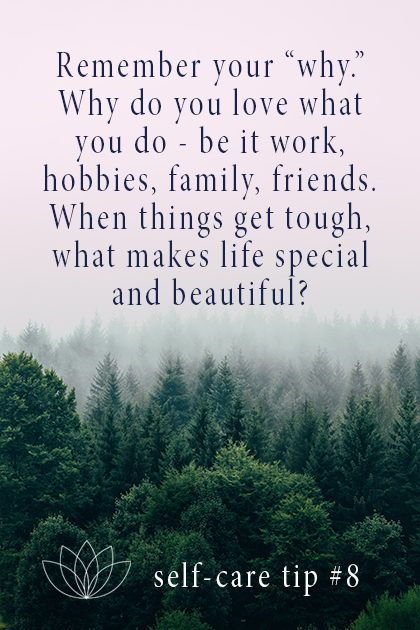
Self-care Tip Eight - Remembering your Why
Next time you find yourself feeling down, take a minute to find your why. In fact, writing down why life is beautiful and important to you and posting your reasons in places you'll see throughout your day is a great way to remind yourself of what's special and great about your life. Whether it's your grandchildren or children, your significant other, your favorite things to do, your career or whatever it may be, a reminder of what's important can bring things back into perspective.
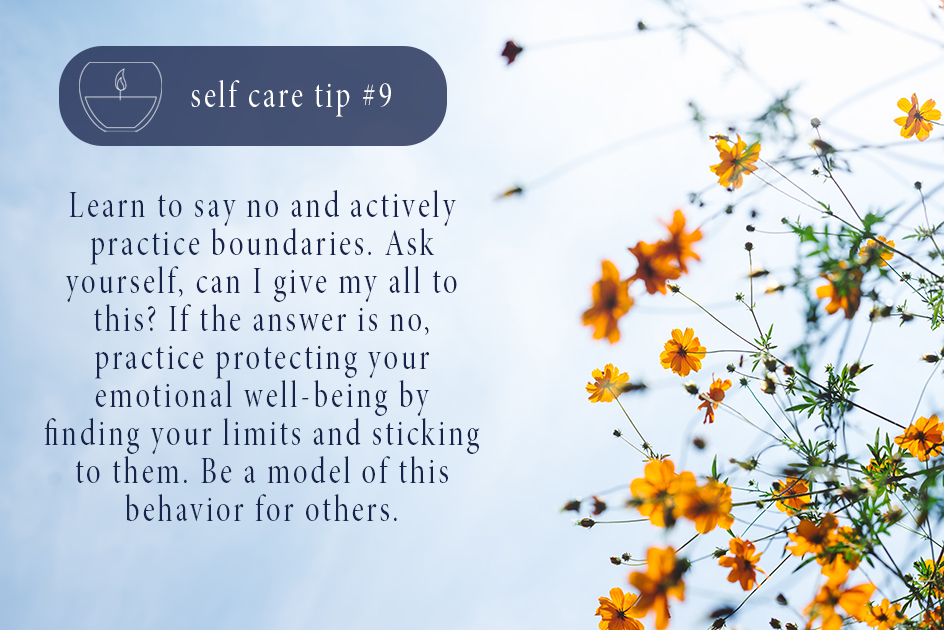
Self-care Tip Nine - Saying No
Saying no and setting boundaries can be one of the most difficult things we can do. That's why we need practice. Deciding how much you can reasonably do can often mean paying attention to your physical and mental health. Do you need a break? Is doing one more thing going to be just too much? Listen to your body and emotions, learn your limits, set boundaries and say no when you need to. Remember, taking care of yourself is taking care of others! The better you feel, the better you'll be for those around you.
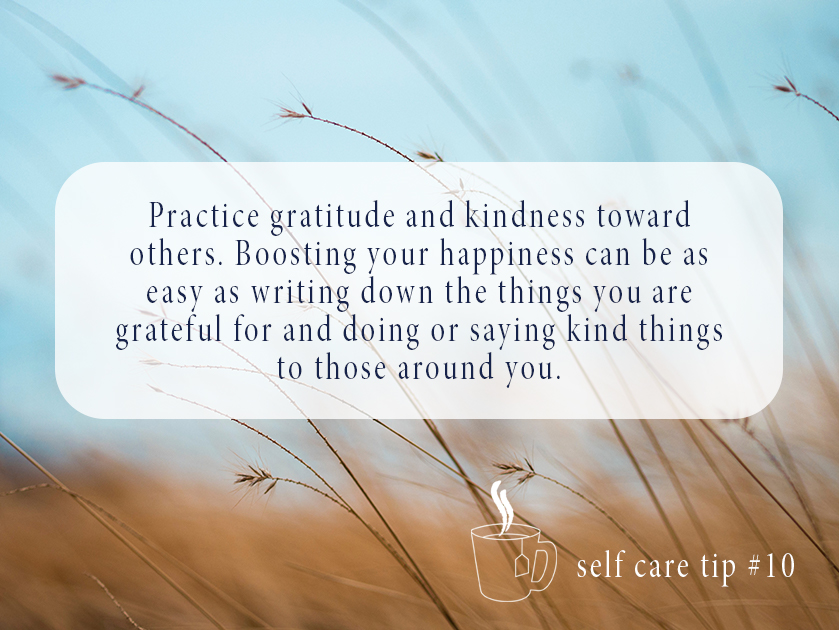
Self-care Tip Ten - Kindness and Gratitude
Feeling down and need a boost? Making a list of the things you're grateful for or starting a gratitude journal can give you that quick jolt of joy you've been craving. After all, we've all got a lot to be thankful for despite hard times. Another easy way to feel good? Say something kind or do something nice for others and you'll immediately feel connected and positive. Check out this article from Greater Good for research on why doing nice things for others makes you happy.
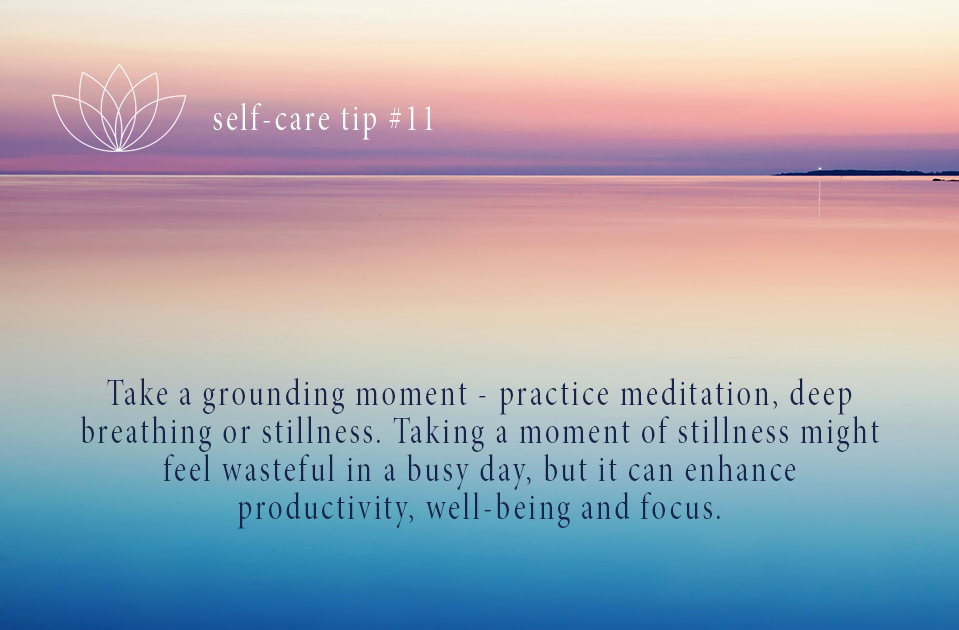
Self-care Tip Eleven - Taking a Grounding Moment
While some people might say meditation sounds like a religious or spiritual practice, it doesn't have to be. Meditation or taking a moment to be still can come in many different forms, from doing a quick breathing exercise, to naming the things you see, hear or feel to simply taking a moment to re-center and check in with yourself with eyes closed. Whatever form your practice takes, it will make you feel better to take a break, recharge and focus on your inner needs.
If you find you need more support, there are both national and NH-based resources for mental health support. If you or someone you know is struggling, please consider reaching out to one of these resources.
Check Out Our New Health & Well-Being Page
Our specialists help create healthy people and healthy places in New Hampshire.
Featured LINK
Mental Health Resources for New Hampshire - a printable county-specific guide to help New Hampshire residents find local, state, and national mental health resources.
